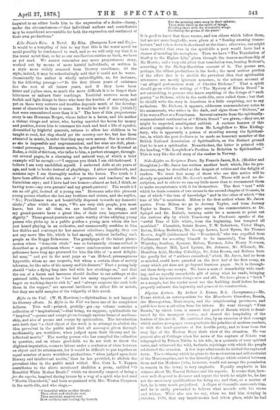Like Dian's Kiss. A Novel. By Rita. (Sampson Low and
Co.)— It would be a tempting of fate to say that this is the worst novel we could possibly be condemned to read, and so we will only say that it is the worst novel that, so far as our recollection carries us back, we have as yet read. We cannot remember any more preposterous story, worked out by means of more hateful individuals, or written in a style more widely removed from literary excellence. Of the style, indobd, it may be unhesitatingly said that it could not be worse. Occasionally the author is wholly unintelligible, as, for instance, in the following passage :—" In the first fifteen years of existence lies the root of all future years, and if they have been bitter and joyless ones, so much the more difficult it is to forgot their bitterness or unlearn their teachings. Youthful sorrows seem but foolish and light things to those who bear the burden of maturity, and yet on those very sorrows and troubles depends much of the develop- ment of character in time to come. It-would be well if this [which?] fact were remembered more than it is." The hero of this preposterous story is one Hermann Berger, whose father is a baron, and his mother a violent virago and miser, who, having married the baron for money and position, forces him to renounce his rank and lead a life of squalor, diversified by frightful quarrels, refuses to allow her children to ho taught to read, lest they should get the mastery over her, but has them educated in music, in order that they may earn money. She is as odious as she is impossible and ungrammatical, and her sons are dull, phan- tasmal personages. Hermann meets, in the gardens of the Kursaal at Baden, a child of thirteen, who talks to him, a perfect stranger, through- out several pages, in a charming and natural way, of which a brief example will be enough :—"I suppose you think I am old-fashioned. I believe I am very unchildish myself. I eschewed dolls at six years of age, and took to books instead of playthings. I abhor needlework, and mamma says I am thoroughly useless in the house. The truth is I have been afflicted with two sets of governors and teachers,' as the Catechism says ; and I have had two homes—almost as bad, I think, as having none—my own parents' and my grand-parents'. The result is I am an old girl, instead of a young one." Hermann asks this pleasant young person whether she has any brothers and sisters, and she replies, " No ; Providence was not bountifully disposed towards my domestic circle ;" after which she says, " We are very rich people, you must know, but for all that, we are inclined to be stingy, and my grand-parents have a great idea of their own importance and dignity." These grand-parents are quite worthy of the edifying young person who picks up in a public garden a young man whom she has just heard playing in an orchestra, and unreservedly confides to him her dislike and contempt for her nearest relatives ; happily, they are not any more like life, which is bad enough, without including such people as the Rogge Delawares. The grandpapa of the infant pheno- menon whose "domestic circle" was so fortunately circumscribed is described as a gentleman whose " suave condescension and excessive politeness have long ago procured for him the title of ' a most delight- ful man,' " and yet in the next page as "an ill-bred, presumptuous hypocrite, whom no one respects, but whom a certain class of society tolerates, for the sake of his money and his dinners." That a young lady should "take a flying leap into bed with her stockings on," and that the son of a baron and baroness should decline to eat cabbage at the paternal table, because he " has had too many experiences of cab- bages on washing-days to risk it," and "always suspects the cook boils them in the copper," are unusual incidents in either life or novels, but they are mild samples of the vulgarity of this novel.


































 Previous page
Previous page